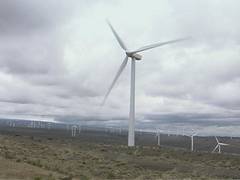forum
library
tutorial
contact

Wind Farms Curtailed Again
as BPA Copes With Runoff
by Steve Ernst
NW Fishletter, June 3, 2011
|
the film forum library tutorial contact |

|
Wind Farms Curtailed Again
by Steve Ernst
|
 BPA curtailed another 23,987 MWh of generation last week in accordance with its controversial environmental redispatch program as the spring runoff ripped through the Columbia Basin.
BPA curtailed another 23,987 MWh of generation last week in accordance with its controversial environmental redispatch program as the spring runoff ripped through the Columbia Basin.
Since it was enacted May 13, BPA has curtailed a total of 36,387 MWh in 10 episodes, to keep dams generating more power, and reducing the amount of dissolved gas created by uncontrolled spill at dams that can harm migrating salmonids.
No legal challenges to the redispatch policy had been filed as of May 27, but several sources reported that FERC's alternative dispute resolution team met with lawyers from BPA, Iberdrola Renewables and other wind generators in Portland for most of the day May 26.
While the redispatch program entered its second full week of operation, the American Wind Energy Association held its annual wind power conference in Anaheim, Calif., giving wind advocates a platform to bash BPA's redispatch program.
U.S. Rep. Earl Blumenauer, D-Ore., echoed AWEA's claims that BPA's redispatch program is in "direct conflict" with the renewables goals of the Obama administration.
"The Northwest Wind Integration and Action Plan drafted in 2007 outlines what actually should happen. But 50 months later, this action represents an unfortunate failure of political will and imagination," Blumenauer said.
However, the action plan focuses mostly on integration issues, rather than over-generation situations.
"We have said all along that one of the big issues is that we need to distinguish between the integration and oversupply situation," Doug Johnson, spokesman for BPA, told NW Fishletter.
"We have done most, if not all, of what was called for in that plan," Johnson said. "A lot of what was discussed looked at the technical issues of adding 6,000 MW by 2020. We have reached the amount of wind expected in the plan about a decade" ahead of time, Johnson said.
Rob Gramlich, senior vice president for public policy of AWEA, claimed that "thousands of megawatts of fossil generation" were still being operated and could be "displaced."
"Also, it's not technically a surplus if the transmission ties aren't filled--meaning other markets could take the power," he said. "It is how the power grid operates in much of the rest of the country and the rest of world. Look at Denmark where they have 20 percent wind. They use their connections with Norway to sell power or store it behind hydropower dams. There is a lot of potential to do the same thing in this region."
Gramlich added, later in a press conference, that "I think there's a preference for keeping certain types of generation running and to benefit certain customers and not others."
Johnson said that BPA has about 7,000 MW of thermal generation in its balancing authority and has curtailed all but about 200 MW, or enough needed to operate the grid safely. He also said that BPA has had discussions with thermal generators in the West outside of its balancing authority about curtailing generation, but so far hasn't reached any agreements.
Last week, hydro generation in BPA's balancing authority was spiking near 13,000 MW, wind generation topped out at 3,500 MW on May 26, and thermal generation hovered between 100 and 200 MW in BPA's BA. Load fluctuated between 3,000 and 7,000 MW.
"I believe we will see legal action very soon," Gramlich said.
Pat Ford, executive director of Save Our Wild Salmon, continued to call for more spill, saying this would be "the safest way to get young salmon heading to the ocean past big dams. And by reducing hydro generation some, it will ease the over-generation problem. "In general," Ford said, "wind generation and salmon restoration are complementary objectives, not competing objectives. The current situation is fundamentally a problem of too much hydro coupled with the state of energy markets--not a wind power problem."
The Northwest Wind Integration Steering Committee is scheduled to discuss BPA's environmental redispatch policy June 6 in Portland.
learn more on topics covered in the film
see the video
read the script
learn the songs
discussion forum
